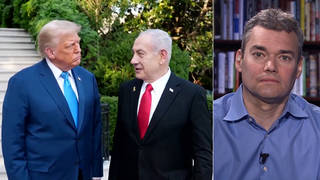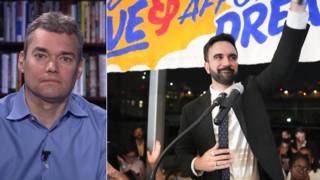
Guests
- Gideon LevyIsraeli journalist and author, columnist for the newspaper Haaretz and a member of its editorial board.
- Noura ErakatPalestinian human rights attorney, legal scholar and assistant professor at Rutgers University.
A Palestinian man in a wheelchair, his pregnant wife and 3-year-old daughter are among the latest victims in Israel’s ongoing bombing campaign in Gaza, which is now in its 11th day. Israeli airstrikes and shelling have killed at least 231 Palestinians, including 65 children, and health officials say 1,700 Palestinians have been wounded. Over 1,300 housing units have been completely demolished or severely damaged. Israeli Prime Minister Benjamin Netanyahu has so far rejected calls for a ceasefire, but Hamas officials say a truce could be reached within a day. President Joe Biden’s defense of Israel’s bombing campaign in Gaza is a continuance of unconditional U.S. government support of Israel, says Israeli journalist Gideon Levy. “When will be the stage in which the world or the American president will say, 'Enough is enough. This is not self-protection'?” We also speak with Noura Erakat, Palestinian human rights attorney and legal scholar, who says the shift in rhetoric and support for a free Palestine among some lawmakers and people in the U.S. is significant and “reflects years of movement work on the ground.”
More from this Interview
- Part 1: Gideon Levy & Noura Erakat on Israel’s Gaza Assault, U.S. Complicity and Ending the Occupation
- Part 2: “It Is Apartheid”: Rights Group B’Tselem on How Israel Advances Jewish Supremacy Over Palestinians
- Part 3: Angela Davis & Noura Erakat on Palestinian Solidarity, Gaza & Israel’s Killing of Ahmad Erekat
Transcript
AMY GOODMAN: A Palestinian man in a wheelchair, his pregnant wife and 3-year-old daughter are among the latest victims in Israel’s devastating bombing and shelling campaign in Gaza. On Wednesday, an Israeli missile struck the home of Eyad Salha as he and his family were preparing for lunch. Israeli airstrikes and shelling have killed at least 231 Palestinians, including 65 children, over the past 11 days. Seventeen hundred Palestinians have been wounded. Israeli authorities say 12 people have died inside Israel from rockets fired from Gaza.
Israeli Prime Minister Benjamin Netanyahu has so far rejected calls for a ceasefire, but Hamas officials say a truce could be reached within a day. On Wednesday, President Biden spoke to Netanyahu and reportedly told him he, quote, “expected a significant de-escalation today on the path to a ceasefire.” Despite Biden’s request, Israel continues to bomb Gaza. Earlier this morning, Israel bombed the crowded Jabaliya refugee camp.
Meanwhile, at the United Nations, the United States is continuing to oppose efforts at the U.N. Security Council to call for a ceasefire. France has circulated a new resolution, but the United States has already come out against it. The U.S. previously blocked three other U.N. Security Council resolutions and statements.
On Wednesday, Israeli Prime Minister Benjamin Netanyahu thanked President Biden for his support.
PRIME MINISTER BENJAMIN NETANYAHU: [translated] I especially appreciate the support of our friend, U.S. President Joe Biden, for the state of Israel’s right to self-defense. I am determined to continue this operation until its objective is achieved: to restore quiet and security to you, the citizens of Israel.
AMY GOODMAN: Meanwhile, Palestinian President Mahmoud Abbas spoke Wednesday, demanding an end to the Israeli attack and the occupation.
PRESIDENT MAHMOUD ABBAS: [translated] Our work is now focused on stopping the Israeli aggression against our people in Jerusalem, West Bank and Gaza, then entering a serious political process, under clear international backing, that leads to ending the Israeli occupation of the lands in the state of Palestine, including East Jerusalem, our revered capital, and reaching a full and fair solution that is agreed upon for the refugees according to Resolution 194, to achieve fair peace in the region.
AMY GOODMAN: We’re joined now by two guests. Noura Erakat is a Palestinian human rights attorney and legal scholar. She’s an assistant professor at Rutgers University, author of Justice for Some: Law and the Question of Palestine. She’s joining us from Fairfax, Virginia. And, in Tel Aviv, we’re joined by Gideon Levy, an award-winning Israeli journalist and author, a columnist for the newspaper Haaretz and a member of its editorial board. He’s also the author of the book The Punishment of Gaza.
Gideon Levy, let us begin with you. You have written piece after piece on what’s taking place right now. We have just talked about the latest of a number of conversations the president of the United States, President Biden, has had with the indicted — sitting on trial for corruption — prime minister of Israel, Netanyahu. Now, it is known that they are not the best of friends. Obviously, Netanyahu was very close to President Trump. But even with this lack of friendship, it sounds like he couldn’t have right now a better friend than Biden, who has repeatedly, at the United Nations, stopped U.N. Security Council resolution after resolution calling for a ceasefire, the latest one from France. Can you talk about the significance of the U.S.-Israeli relationship, especially now with the Biden administration expediting $735 million worth of precision-guided missiles to Israel in the midst of Israel’s bombardment of Gaza, with Netanyahu saying they don’t plan to end this anytime soon?
GIDEON LEVY: Good morning, Amy.
It’s unbelievable how things repeat themselves. Administrations are changing. Prime ministers in Israel are changing. Reality is changing. And the traditional policy of backing Israel automatically and blindly, supporting it and financing it and arming it, does not change.
Now, you see, Amy, it’s not about talking anymore. I mean, Israel learned to live also with condemnations. The State Department might condemn. Even the Security Council can condemn. It’s time to go to move to deeds, because if we want really to stop all this, Israel must feel it. Israel must be taken accountable for those crimes. Israel must pay for those crimes. And I don’t see any intention of moving from talkings to deeds.
Joe Biden, I’m sure his heart is in the right place. So was Barack Obama, obviously. But by the end of the day, they are supporting all this. What does he mean, the American president, that Israel has the right to protect itself? Sure, it has the right to protect itself. But at any price? With any means? Without any restraints? I mean, when will be the stage in which the world or the American president will say, “Enough is enough. This is not self-protection, killing 70 children. This is not self-protection to destroy, again and again, Gaza. And, above all, it doesn’t serve Israel”?
AMY GOODMAN: Explain how it doesn’t serve Israel. And what is the Israeli popular response right now, the response of the Israeli population?
GIDEON LEVY: This is maybe the most depressive side of it, except of the horrible scenes from Gaza, because you look at Israeli media and you look at Israeli public opinion and the Israeli discourse, and you hear only one voice, a voice of cheering to the fighting, of asking for more, of asking for more blood, of supporting the IDF in an unconditioned way, no criticism and, above all, no real information, because the Israeli average viewer, TV viewer, didn’t see nothing of Gaza. You see here and there those towers falling down — it’s very photogenic — but nothing about the sacrifice, nothing about the agony, nothing about the families, nothing about the suffer, the children, everything. Israelis don’t see it, which helps them to feel so good about themselves and to feel so just about themselves.
But by the end of the day, this is brainwashing. This denial is also part of the brainwash system, namely that all Gaza is Hamas, that everything that the IDF is doing is moral, and that they deserve all this, and they are to be taken accountable for everything that happens. If you ask any Israeli, he will tell you it’s only the fault of the Hamas. And then you ask him, “Is there any kind of accountability, responsibility, moral responsibility, for Israel?” “Not at all. We have the most moral army in the world.”
AMY GOODMAN: I want to bring in Noura Erakat, Palestinian human rights attorney, legal scholar, assistant professor at Rutgers University, author of Justice for Some: Law and the Question of Palestine. Hundreds of Palestinians have died in Gaza, have been killed in the Israeli military bombardment of this enclave, of — extremely crowded, of millions of people. In the United States, in the corridors of power, the Biden White House, yet still has so much sway over what Israel does, because it is the largest recipient of U.S. military aid in the world, yet we are seeing a fracturing of the Democratic Party, Noura Erakat, and you have a front-row seat here, being in the United States. Can you talk about whether this has surprised you? Does it make a difference to you, as Palestinians die? The U.S., of course, has the first, now, Palestinian American congresswoman in U.S. history, Rashida Tlaib, who, on Eid al-Fitr, gave a powerful address on the floor of the House, wearing a keffiyeh.
NOURA ERAKAT: Thank you, Amy.
I want to emphasize that even when Palestinians aren’t dying, that the Israeli campaign targeting farmlands, targeting medical specialists, targeting roads to hospitals, targeting schools, targeting clinics, targeting bookstores — all of that reduces the chances of life. So, even if Palestinian life is spared in their flesh, they have limited chances of survival or horizons for that life. And so we should emphasize the structural nature of these attacks.
I’ve been very pleased and heartened by the shift in U.S. politics, though not completely surprised. The progressive — what they call the progressive insurgency within Congress, and specifically the progressive flank of the Democratic Party, reflects years of movement work on the ground, where prior to even the word “intersectional” emerged, that emphasize the entwinements of joint struggle, of our joint survival and our joint resistance, between Indigenous, Black, Brown communities — have brought these new lawmakers to power, so that the analysis that they are sharing with us now on the House floor both reflects those grassroots constituencies as well as the analysis that’s been forged in the crucible of struggle.
For example, Representative Cori Bush, who came to Washington on the shoulders of movement in Ferguson, Missouri, gave a moving speech on the House floor in dedication to a fallen warrior, Bassem Masri. And she emphasized there that Black and Palestinian solidarity is real, and there is a commitment not because of some theoretical framework, but because of the work they did on the ground during the Ferguson-Gaza moment, during the occupation of Ferguson in 2014 and the simultaneous bombardment of Gaza, when it became clear and evident that Israeli and U.S. state violence are not the same, but quite similar, and operate through similar circuits of capital and profit.
The fact that U.S. police officers from Ferguson were trained by Israeli army personnel and Israeli police, the fact that similar technologies are used in U.S. prisons as well as Israeli prisons for surveillance, the fact that similar tactics of racial profiling are used, the fact that excess weapons from U.S. war making in the Middle East — its endless war making in the Middle East — are then distributed to local law enforcement offices here in the United States makes clear that this is not about self-defense, that this is not merely about a struggle for civil rights, but that this is about state violence and oppression meant to maintain the supremacy of one racial group above all.
And so, I’m excited by the shift in Congress, though not surprised. And I hope to see more of it as grassroots movements continue to take leaders to Washington.
AMY GOODMAN: We’re going to break and then come back to this discussion. We have an hour with our guests, Noura Erakat, Palestinian human rights attorney and legal scholar here in the United States, and Gideon Levy, speaking to us from Tel Aviv, Israeli journalist and columnist for Haaretz and a member of its editorial board. We’re also going to hear from the head of B’Tselem, the leading Israeli human rights organization, and Angela Davis expressing solidarity with the Palestinian people. Stay with us.












Media Options